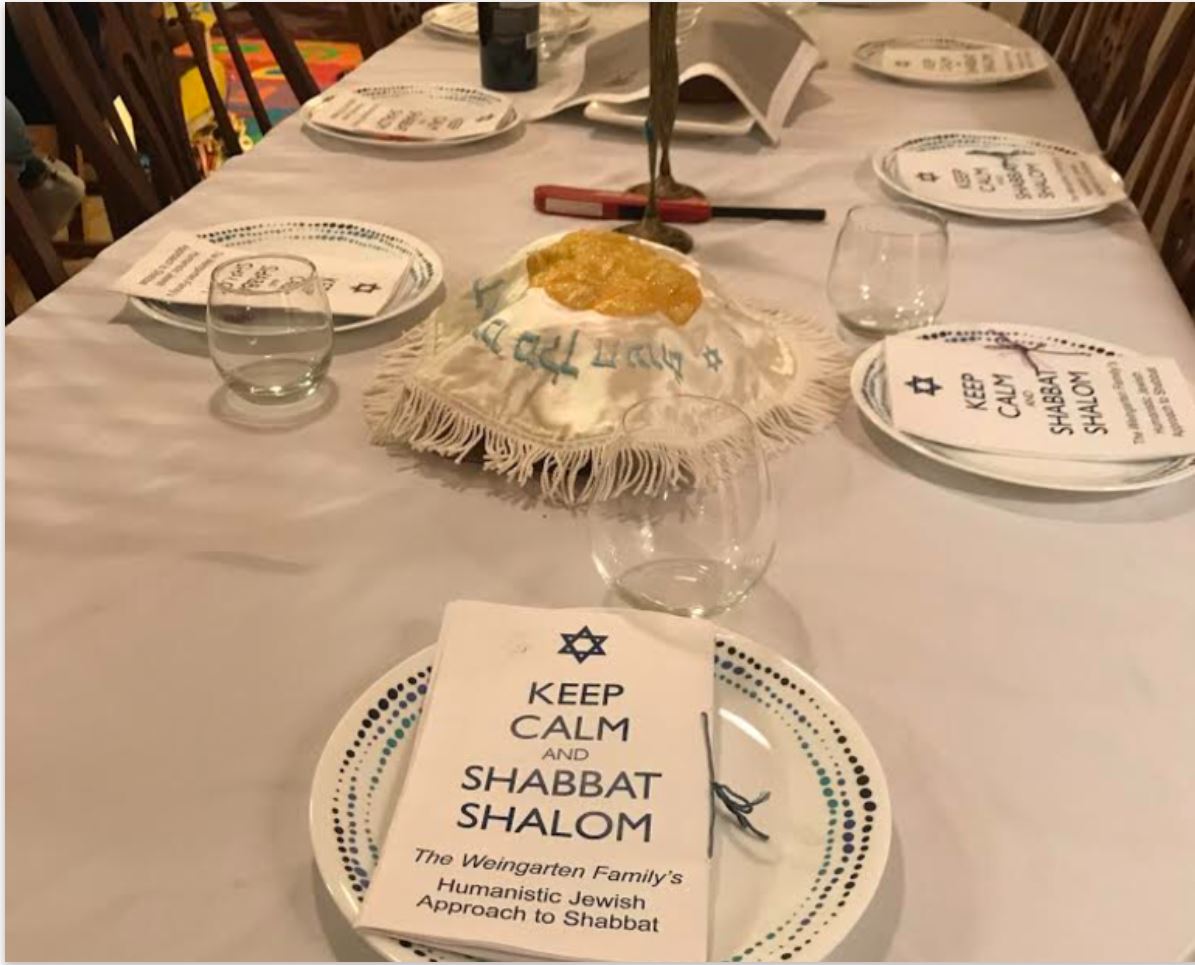 Photo by Oren Peleg
Photo by Oren Peleg On a recent Friday night, more than a dozen guests filled Jenn Weingarten’s cozy Inglewood home. The young-adult crowd — all in their 20s or 30s — chatted over drinks as planes roared overhead taking off and landing at Los Angeles International Airport. A couple of young children fiddled with board games and banged on a toy piano. Molly, a ginger cat, jumped down from her felt play structure. “She scratches, so watch out,” Weingarten warned cheerfully, wine glass in hand.
The dance of dinner prep and socializing took place in the cramped kitchen. Garlic knots were brushed with olive oil and shoved in the oven. More wine was poured and downed. Assorted salads were tossed. Lasagna bubbled in a slow cooker. Rotisserie chicken and a challah from Ralphs arrived.
The storm before the calm of Shabbat.
“It’s hectic but this is just most Friday nights around here,” someone said as everyone gathered around three joined tables. But it was OneTable, a Jewish non-profit, that had brought together everyone.
Weingarten, 37, who works for UCLA’s Travel Studies program and runs a dairy-free baking business on the side, hosts at least 10 guests comprising Jews and non-Jews every other Friday night with the help of OneTable, a startup with a mission to inspire young adults developing a lifelong Shabbat practice. Over the past three years, 85,000 unique participants have attended more than 14,000 OneTable dinners in 125 cities across the country.
Andalucia Lopezrevoredo, OneTable’s associate director of West Coast programs, said her organization has set its sights on attracting people in their 20s and 30s out of college. “That’s the population where we feel it’s easiest to opt out of a Friday night ritual,” she said. “We’re finding that this target audience, when given the tools, is opting in with a fervent desire to be a part of the community.”

In Los Angeles, where the organization is supported by a Cutting Edge grant from the Jewish Community Foundation of Los Angeles, some 4,500 unique guests have attended nearly 600 OneTable Shabbat dinners.
“Without OneTable, I couldn’t do this, and I love opening my home to new people and sharing this with them,” Weingarten said. “I wouldn’t even be able to afford it.”
Aside from “Shabbat coaching” services from veteran hosts, OneTable also provides “nourishment,” which covers $10 a head for closed dinners (open only to your friends) and $15 a head if you host a public dinner (open to anyone who registers ahead of time on the OneTable website or app). When necessary, Weingarten pre-approves strangers via brief email correspondence and scanning of social media accounts.
“One tradition from Weingarten’s childhood was included in the dinner. ‘My dad had a tradition of going around and asking what’s making you happy. Even after a really horrible week, we had to come up with something.’”
— Jenn Weingarten
Weingarten’s dinners include roommates, co-workers, friends, friends of friends, significant others, her 2-year-old daughter, Lishai, and the occasional walk-in.
“A few weeks ago, I had a college student home for summer come just because he wanted to get out of his parents’ house for a bit,” Weingarten said. “He played with Lishai a bunch and he was great.”
With dinner ready, Weingarten directed everyone to haggadah-like booklets with “Keep Calm and Shabbat Shalom” on the cover. Led by their host, they held a short service singing modified versions of songs including “Havah Nagilah,” reciting prayers and reading English passages about the Sabbath.
During a rare moment of quiet, Weingarten, who grew up Conservative with a traditional Shabbat practice every week, said, “This is very open and inclusive. It’s more humanistic Judaism, where we take a relevant spin on aspects and traditions and show you how you can actually program some of it into your daily life.”
But one tradition from Weingarten’s childhood was included in the dinner. “My dad had a tradition of going around and asking what’s making you happy,” she said. “Even after a really horrible week, we had to come up with something.”
But first, Weingarten whipped out a selfie stick and instructed everyone to crowd the frame for a “Shabbat selfie” — a staple of her dinners.
“I’m just so happy to be here. My Jewish grandmother would be even happier,” a half-Taiwanese, half-Jewish USC undergrad student said.
Alejandra Priede-Schubert, 34, one of Weingarten’s closest friends and frequent guest, brought two friends who were visiting from Mexico. It was their first Shabbat and first Jewish ritual experience of any kind. “This is very special for us, to be here with all of you on this occasion,” one of them said.
“There are a lot of people who’ve never encountered Jews before,” Weingarten said afterward. “All they have to go on might be what they hear in the media, which isn’t always kind. Exposing them to these kinds of beautiful values of Judaism in a way they can relate to and connect to is really lovely.”
Weingarten was a part of Priede-Schubert’s first Shabbat a decade ago. While growing up in Mexico, her family had traditions like avoiding pork products and lighting candles on Friday night. It wasn’t until around the time she met Weingarten while earning her doctorate at UCLA that she discovered her prewar, European-Jewish roots and began celebrating Jewish holidays.
“Every Shabbat now is an opportunity to learn something about the Jewish traditions,” she said. “I think I’ll always want some form of Shabbat, at least
this type of weekly family gathering, in my life.”





















 More news and opinions than at a Shabbat dinner, right in your inbox.
More news and opinions than at a Shabbat dinner, right in your inbox.